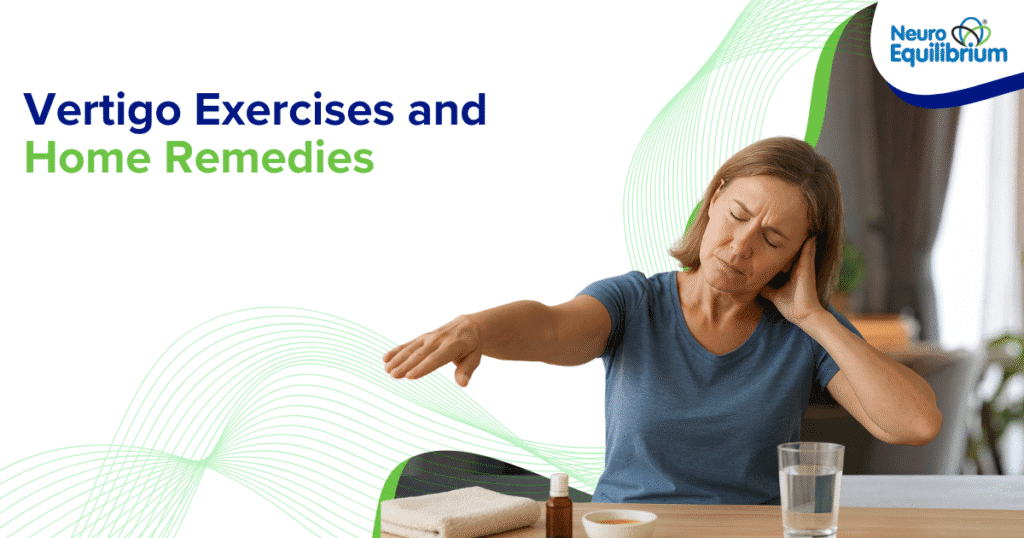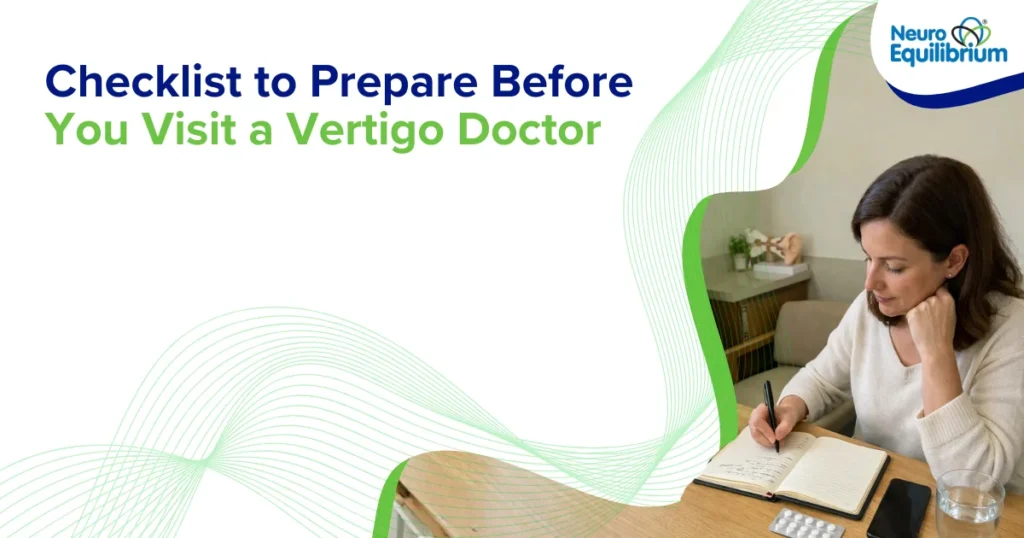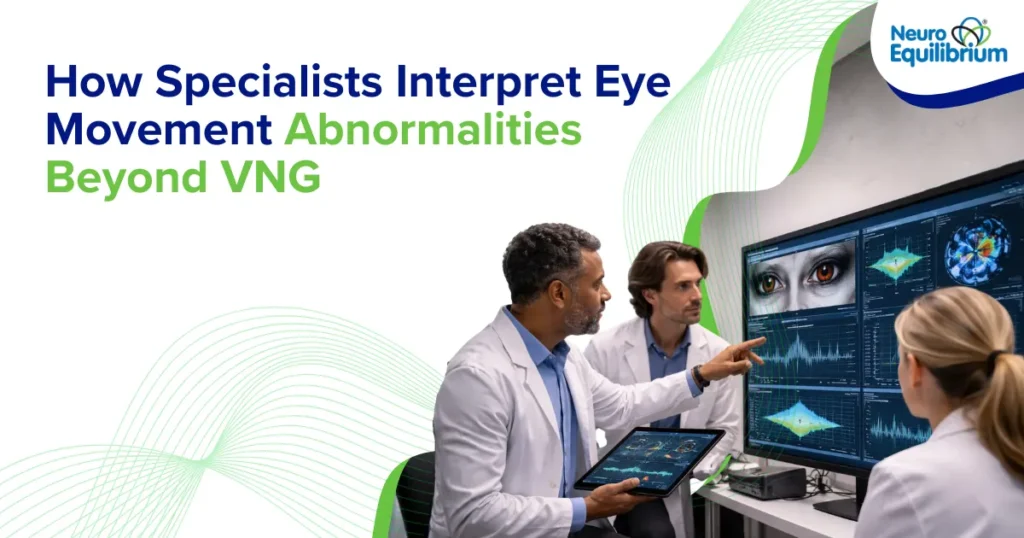Vertigo is a symptomatic disorder due to problems of the inner ear or the brain. When the inner ear gets affected due to an injury, infection, or any other cause, the person experiences vertigo or unsteadiness. For many patients, home remedies for vertigo and simple balance exercises can provide relief when done correctly under guidance.
Know More About
- 10 Early Signs You Might Have a Vestibular Disorder
- How Juggling Enhances the Balance System and Coordination
- 5 Questions to Ask Your Doctor Before Vestibular Testing
Inner Ear Problems That Cause Vertigo
- Meniere’s Disease
This is caused by the excess fluid build-up in the inner ear that may cause hearing loss and a blocked ear feeling along with vertigo. It usually affects one ear. Following a low-salt diet and relaxation techniques like yoga for vertigo treatment can help manage symptoms. - BPPV (Benign Paroxysmal Positional Vertigo)
In this condition, calcium carbonate crystals (otoconia) get displaced in the semicircular canals, leading to vertigo. This is one of the most common conditions treated with vertigo home remedy techniques and vestibular exercises. - Vestibular Neuritis
A viral infection in the inner ear that leads to vertigo and imbalance. Exercising how to stop vertigo can help retrain the brain and restore balance gradually.
Other Common Causes of Vertigo
Vestibular migraine, labyrinthitis, perilymph fistula, stroke, multiple sclerosis, and medication side effects can also trigger vertigo. Some of these may benefit from personalized remedies for vertigo, including gentle exercises, yoga, and dietary changes.
Vertigo Exercises
These treatment vertigo exercises and yoga routines, also called vestibular rehabilitation exercises, help to improve balance and reduce dizziness by stimulating the central nervous system.
They help stabilize vision on moving objects, improve posture, and make daily movement easier. Before starting, consult a vertigo specialist to identify the most suitable exercises on how to stop vertigo safely at home.
Some Home Exercises Include:
- Head Movement
Sit straight with your eyes focused on your thumb and move it side-to-side while following with your head. This simple vertigo home remedy improves visual focus and balance. - Exercise While Walking
Walk in a straight line and slowly turn your head side to side. This is one of the best exercises on how to stop vertigo naturally. - Sitting and Standing
Practice sitting and standing repeatedly to build balance and coordination. - Throwing & Catching Ball
Throw and catch a ball above eye level this helps strengthen reflexes and improve spatial awareness. - Touch the Toes
Bend down to touch your toes with a fixed gaze. This easy stretch promotes blood flow and stability.
It is not advisable to perform the Epley, Semont, or Brandt-Daroff maneuvers without consulting a vertigo specialist.Experts at NeuroEquilibrium guide patients with customized treatment vertigo exercises and yoga programs designed for their specific vestibular disorders.

Home Remedies for Vertigo
After performing exercises, try these vertigo home remedies to reduce dizziness episodes:
- Yoga & Meditation: Proven relaxation techniques that reduce anxiety and improve balance.
- Low-Salt Diet: Recommended for patients with Meniere’s disease or vestibular migraine.
- Vitamin D: Essential for bone and inner ear health deficiency can worsen vertigo.
- Avoid Alcohol & Limit Caffeine: Reduces dehydration and nerve sensitivity.
- Maintain Regular Sleep: A steady routine improves inner ear balance.
- Reduce Screen Time: Prolonged exposure to screens can trigger dizziness.
These remedies for vertigo and lifestyle adjustments can provide long-term relief and reduce the frequency of attacks.
Medical Guidance
Before starting any vertigo home remedy or exercise plan, consult a vertigo specialist. They will conduct diagnostic tests and recommend a customized plan combining treatment vertigo exercises yoga with other medical therapies if necessary. NeuroEquilibrium specialists help track your improvement and ensure your home-based remedies for vertigo are safe and effective for long-term relief.
Sources
- Han B.I., Song H.S., Kim J.S. (2011). Vestibular Rehabilitation Therapy: Review of Indications, Mechanisms, and Key Exercises. PMC. https://pmc.ncbi.nlm.nih.gov/articles/PMC3259492/ (PMC)
- Hall C.D., et al. (2022). Vestibular Physical Therapy for Peripheral Vestibular Hypofunction: Clinical Practice Guideline. Journal of Neurologic Physical Therapy. https://journals.lww.com/jnpt/fulltext/2022/04000/vestibular_rehabilitation_for_peripheral.8.aspx (Lippincott Journals)
- “4 Exercises for Peripheral Vertigo.” Healthline. https://www.healthline.com/health/exercises-for-vertigo (Healthline)
- “Home remedies for vertigo: The Epley maneuver and more.” MedicalNewsToday. https://www.medicalnewstoday.com/articles/320492 (Medical News Today)
- “Home-based vestibular (balance) exercises.” Vestibular Disorders Association (VeDA). https://vestibular.org/article/diagnosis-treatment/treatments/home-based-exercise/ (Vestibular Disorders Association)
- “Vestibular Exercises for Dizziness and Balance Problems.” UMC Health ENT Patient Handouts. https://umc.edu/Healthcare/ENT/Patient-Handouts/Adult/Otology/Vestibular_Exercises.html (umc.edu)
- “Physical therapy for vertigo: Exercises, benefits, and more.” MedicalNewsToday. https://www.medicalnewstoday.com/articles/physical-therapy-for-vertigo (Medical News Today)
- “Vestibular (Balance) Exercises: Fact Sheet.” Brain & Spine Foundation. https://www.brainandspine.org.uk/health-information/fact-sheets/vestibular-rehabilitation-exercises/ (brainandspine.org.uk)
- “Vestigo: Vertigo, Dizziness and Balance Disorders — Treatment & Rehabilitation.” PMC article on vestibular disorder treatment. https://pmc.ncbi.nlm.nih.gov/articles/PMC8920002/ (PMC)
What are the best exercises for vertigo?
Vestibular rehabilitation exercises such as head movement exercises, walking with head turns and sitting-to-standing exercises are used to enhance balance and minimize dizziness.
Can I do vertigo exercises at home safely?
Yes, one can perform simple exercises at home, but such special maneuvers as Epley or Semont must be done only under the supervision of a doctor.
What lifestyle changes help reduce vertigo?
Reduced screen time, yoga, reduced caffeine and alcohol, limiting alcohol intake, low salt diet can decrease the occurrence of vertigo.
Is vertigo a permanent condition?
Not always. Certain causes such as BPPV can be managed whereas chronic ones such as Meniere disease require management over time.
When should I see a doctor for vertigo?
Consult an expert in the case of frequent dizziness, sharpness, or hearing loss, nausea, imbalance, or neurological symptoms.
















